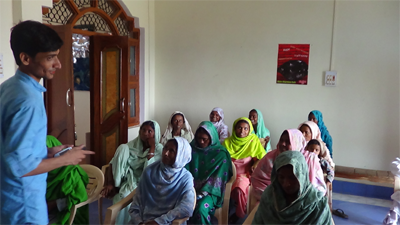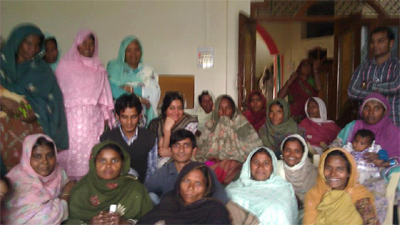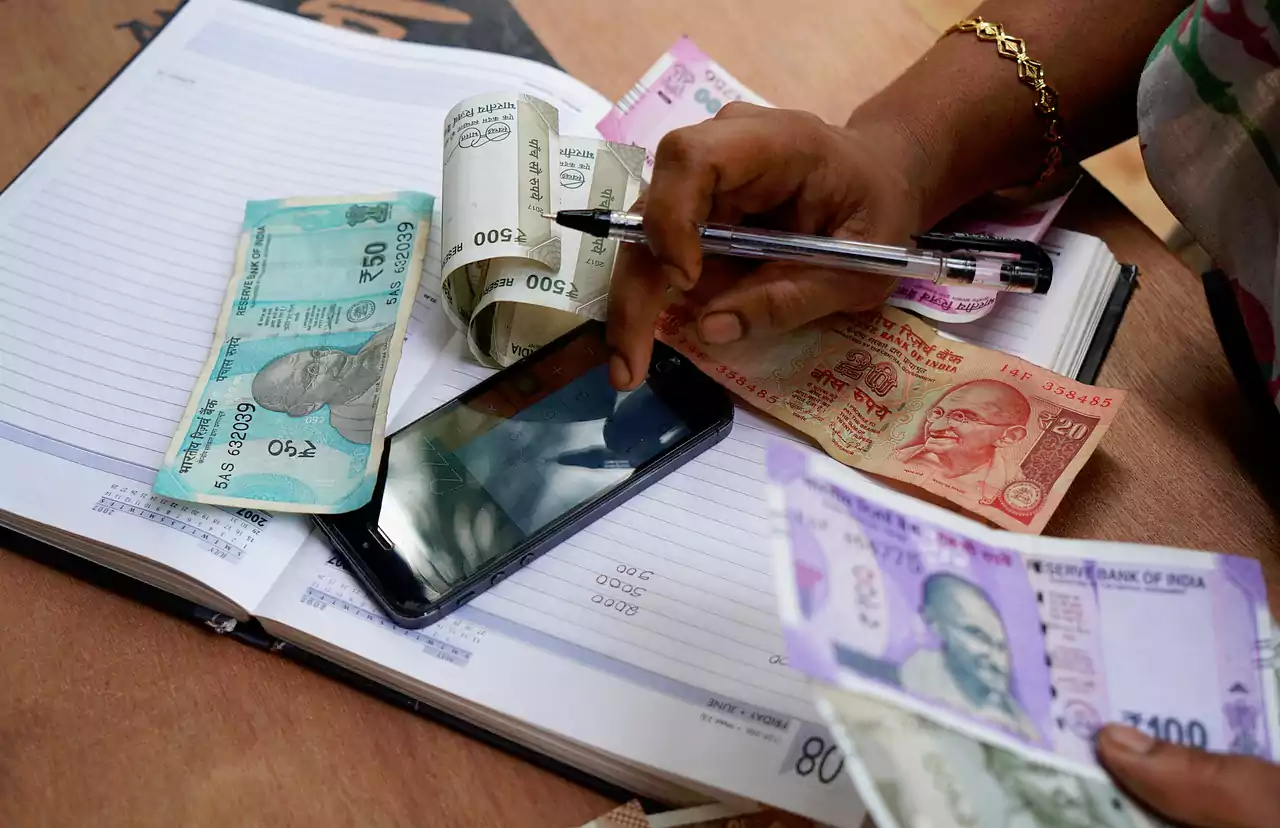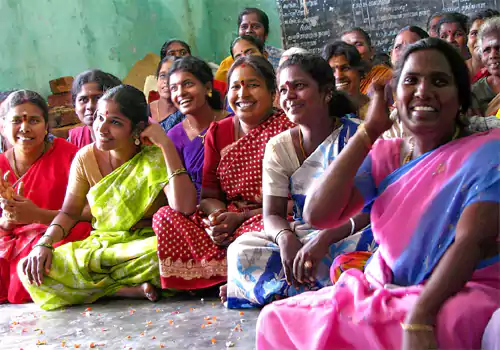Campaign Against Bride Trafficking in India
.png)
“ Campaign Against Bride Trafficking in India,” interview with Mr. Shafiq Ur Rehman, founder of ‘Empower People Organization,’ which helps bride Trafficking and honor crimes against women by Kanakadurga.
We are moving forward and making lot of progress in the society and we thought we got rid of “Kanyasulkam,” parents of the little girl used to pay money to the old aged bridegroom to marry their daughters. After lot of struggle and hard work of so many social reformers it was eliminated from the society and stopped the social evil of Child Marriages. Now we are trying so hard to get rid of the Dowry system from our society, meanwhile other social issues like female infanticide, bride trafficking, where some people convince parents that their daughters will get married, or get jobs, or become heroines to support the family, take money from them along with the girls and they disappear. They take the girls using this method, or kidnap and sell in the villages of North Indian States where men are not getting married as the result of women ratio is getting reduced. These women are tortured, beaten, used as slaves, multiple men in the same family use them for sex, sometimes after having an heir they resell them to the men who offer more money taking the child from the mothers etc. Government is busy with its own problems so someone has to take care of these women.
So Mr. Shafiq Ur Rehman who came from the very progressive family started taking interest in this issue and as he got support from lot of people they all started “Empower People,” organization in order to help these Bride Trafficking and honor crimes against women. It has the membership of at least 10.000 Assam, Bihar, Haryana, Jharkhand, Punjab, Rajasthan, West Bengal and some linkages in Himachal Pradesh. Recently a documentary about Bride Trafficking and the problems faced by these women called “Paro,” was shown in the Rajya Sabha to show the government how it is affecting women in the above mentioned States of North India and do something about it.
I (Kanakadurga) wanted to interview him to know more about this problem, what kind of programs they are taking up to help these rescued women for the readers for Teluguone.com and he agreed to it. He is always busy in either rescuing women, attending conferences or if someone blames them for something happened in the village, he has to be there to clear their misunderstandings etc. in spite of his busy schedule he gave this exclusive interview. Let us try to know by asking him how bad the problem is and what everyone as a citizen supposed to do in order to eliminate this problem. Please read the whole interview and try to help these people.
Kanakadurga: Namaste Shafiq ji, First of all we are all so proud of the work you are doing by starting the Campaign against Bride Trafficking in India! Can you first tell us about yourself so that we will know about your background?
Shafiq Ur Rehman: Thank you so much for all kind words,
I was born and brought up in a progressive peasant family in Gaya (Bihar). I was never a proficient boy in any front. I never tried to play cricket or football or any game, I was an average student in my school. But I was extra-ordinary in organizing school events as well as community service, In 6th class I with my classmate founded a group “Shastri cadet core” (it was a parody of National cadet core) which opens a library in front of school for the drop-out friends who were not able to join any school for some reason. Our other major work was cleaning in school and neighboring areas. I joined a radical communist party in 1998 when I was student of class 8th with a mission to search a solution of suffering and discrimination and unfortunately I never attended any class after 8th class, that’s how I discontinued my education, but learned a lot by observing people, social problems, by reading lot of books.

KD: You were involved with the Marxist party before you started this campaign. Why did you come out of that party and what made you start this Campaign?
SR: Yes, I Joined a Maoist group but soon after I realized that we need a sensitive approach than a violent action, soon after I with my friends founded a group career development corner, it was daring step but we opened a total 23 schools in whole district. And finally I decided to leave the party and started my own intervention in the area. Nothing much was done by organized effort but it was a small initiative of a teenager which was supported by community as well as government.
KD: Did you first saw anyone suffering with this problem? When did you first time came across such a case was and what did you do then? What did really make you to take up this cause of bride trafficking and do something about it?
SR: In 2005 we launched EMPOWER PEOPLE in Delhi with a new idea of intervention. We organized a 300km march on foot against female foeticide in Haryana. During this march I met a woman who said that people like her who are living in a difficult situation need help. I assured her that I will meet and try to rescue her after this march. After 6 months of the march I visited her village but I couldn’t find her, when I enquired about her the villagers informed me that may be she ran away from the village but some young people shared the opinion that she might have been be sold by the family with whom she lived to some other man. They also informed me about the menace of bride trafficking and the network involved in this kind of trafficking.
KD: Can you describe what’s really happening when a woman is married brought from a different state into a family where there are 2 to 3 unmarried brothers?
Let me clear out one thing here that these are not lawful or ethical marriages, bride trafficking is simply a form of modern day slavery, and girls are being sold and resold from one person to another. These girls become sex slaves and agricultural laborers. In some parts of Haryana polyandry (Women with more than one husband) still exists not because of sex-ratio but its traditional means of marriage like polygamy (Men with more than one wife). Due to various reasons including law polyandrous marriages are performed secretly without any rituals. Trafficked brides who are known as “Molki” (lit-purchased) jugad (arrangement) or Paro (lit-stolen) are actually commodity on sale. Girls are being sold to 4 to ten times, after they have been used totally until their beauty, energy are gone then they let them settle down with some disable, widower or deserted men.
KD: What is the main cause for this problem? Does Female infanticide is contributing to this problem?
SR: Can we justify any rape only because rapist is not married and not able to find a sex partner? If so, it is but in my opinion its cruel justification coined by buyers. Three major social crimes Sex selective abortions or female infanticide, honor killings and bride trafficking are happening in the region and that indicates the situation of the women in society. The State Haryana have two Gaushalas (Animal shelters) in each block and only three women shelters home in whole state. This is real problem with the society. There are many forcing factors sex selective abortion is one of them but not the only factor. It has a long history of slave trading, traffickers are called Burdafarosh it’s a Persian term for slave traders. That indicates historical background of such trafficking. The forcing factors of Bride Trafficking can be identified as:
1. Cultural beliefs of Polyandry and karewa marriages (When a husband dies wife is forced to marry brother of the husband, sometimes it happens with the consent of women.)
2. Sex selection and declining sex ratio
3. Social Perception of Early Marriage
4. For the purpose of domestic and agricultural labor.
5. Organized trafficking network who sells girls at a very low price.
KD: What is the present ratio of men and women or boys or girls in India?
SR: As per the latest Census in the year 2011, the total female sex ratio in India is 940 per 1000 males and the female child sex ratio is 944 girl children per every 1000 boy children of the same age group. The overall female sex ratio has increased by 0.75 % in the Census 2011 as compared to the previous Census of 2001.

KD: What kind of programs have you designed to create awareness among the people about this problem?
SR: We simply believe in Empowerment of these girls, we are not victimizing them to put in a shelter home or something like traditional anti-trafficking organizations are doing. However we believe in Institutionalization of cause but it should be under leadership of survivor. Our major activities are Sensitization and engagement of community -
1. GENDER AND FEMINIST PERSPECTIVE BUILDING FOR PRI (Panchayati Raj Institution) LEADERS
2. Enabling and strengthening “Mahila Mandals” formed under state government scheme as well as domestic violence cells in districts.
3. Mainstreaming, leadership building and CBO (Community Based Organizations) formation of trafficking survivors as well as local women with a right based approach to ensure safety and community based sustainable reconciliation of outsider and locals.
4. Inclusion is essential part of whole concept and we are trying to organize other right based movements in the society.
5. Advocacy at state and national level to induct cause of bride trafficking and honor crimes in policies as priority.
6. As well as campaigns in source and transit area of trafficking
KD: Do you rescue the women who become the victims of domestic violence and treated as slaves? ) What is ‘Empower People?’ What role does it play in rescuing girls and women?
SR: Yes we rescue these girls who are in difficult situation and trying to ensure their rehabilitation as per needs and their consent. EMPOWER PEOPLE is a registered NGO which coordinates all actions and campaigns in field, it was found in 2005 by me and my friends. The Empower People is functioning as umbrella organization for Bride Trafficking survivors led by 20 community based organizations. It generates funds legal and other required supports for these Community Based Organizations. The EMPOWER PEOPLE is responsible for whole rescue operation and its follow up.
KD: How do you rescue these women and what kind of help they get?
SR: We used to rescue someone with the help of community as well as police department. And we take full responsibility of the girl’s counseling, shelter, food clothing everything is being provided by Empower People.
KD: Do you get threats from in-laws or husbands whose wives are rescued?
SR: Threats and attacks are part of our life. Every week we receive some calls and sometime our colleagues were attacked but we don’t care
KD: How do you protect yourself from such people and how do you provide protection to the women you have rescued?
SR: We believe in community engagement in every step. Protection of girl is really big challenge but people always support us and ensured the protection of these girls.
KD: Do you get grants from the government or support or encouragement for doing such a wonderful social service?
SR: Last year Union minister of women and child development informed the parliament that “Haryana Government stated that there are no forced marriages (bride trafficking) in the state and that the marriages are also being solemnized across the country breaking the barriers of caste, creed and language.” It is clear that government is not willing to accept it as a problem so they don’t give us any funds or support us. Other donors do not have clear idea of funding, they never fund for any good cause they need to know that Economic prosperity isn't always a sign of social progress. They are working in Bihar on female foeticide where sex ratio is comparatively balanced and good but only because Bihar is not economic sound, they will work on everything.
We have no institutional funding but many of our friends and concerned people are supporting us to continue our battle.
KD: Are there any cases where you have rescued women and sent to their parents back?
Yes, but it’ as bad experience, Girls who were sent to their parents were not happy as there is social stigma and many issues are involved, but in one case it worked out when we recently organized a marriage of a girl in Assam with her class-mate. She is happy with her husband. Many girls were repatriated to their native home but results are not satisfactory.
KD: What if the girls or woman do not want to return to home as they are scared of getting married again by their parents?
SR: Most of girls don’t want to return their native home we respect their opinion and induct them in our campaign. Our most of grass root workers are survivors of bride trafficking. Elected president of EMPOWER PEOPLE is also a survivor of bride trafficking. Some girls are living with their husbands who are supporting them. We all are working to curb the bride trafficking in different capacity.
KD: There is no doubt that it is a major problem or a social evil like child marriages, atrocities against women etc. How can this bride trafficking be stopped? In which states this problem is becoming more? Is it spreading to other states too?
SR: Yes, Bride trafficking is a big problem in Haryana, Rajasthan, Punjab, and western Uttar Pradesh while some other states are becoming source of trafficking; some states like Maharashtra, Madhya Pradesh, and Gujarat are becoming source as well as destination for the trafficking. We are trying to create a peoples movement to break the chain of trafficking network. We are organizing trafficked bride training to the rescued women so that they can become community leaders and work for society. But without Institutionalization of cause, trafficking would never be stopped, there is need of holistic campaign among community, sensitization in political, judicial and law enforcement system and we are trying to make it possible.
KD: What are common people are supposed to do in order to end this problem?
SR: Speak against the odd, people can speak for these angels who are kept under some devils, we as grass root workers always need support, backing and safeguard, readers of this interview are requested to write/speak about bride trafficking, they also can donate us to continue our works, they can write to donor agency that why this topic and area is neglected.
KD: Even though many people are aware that killing the girls before they are born is creating the problem of not having enough women for lot of men to get marry still they are not changing the attitude of choosing boys over the girls. What do you think about it?
SR: Violence against Women is largely prevailing because of the societal mechanism combined with patriarchal values. The cause Bride trafficking is plain and simple result of that notion which leads our society towards sex selective abortions and traditional polyandry marriages in new form. This problem is not just result of sex selection but all these problems and their root causes are parallel. We need to attack on that notion or conceptions.
KD: Can you please share some of the good and bad experiences you have faced since you have got seriously involved in this cause?
SR: Yes, there are many good and bad experiences but I would love to share a good experience, once our executive committee was planning to establish a shelter home for Bride Trafficking victims and we were discussing funds and other details suddenly one of our survivor CBO leader asked me that “Shafiq are you going to allow these girls to have sex in shelter? If no! Who are you to decide that girl doesn’t want to have sex or why you are denying her right to sex”. I was really shocked to come to this point then our executive committee decided to postpone the idea. The survivors and even victims teach us how to deal with some problem. No one can imagine that I was trained by these girls, I never know how to deal with such things but they guide me in difficult times.
Bad experiences are many and generating funds and executing the programs are really tough jobs.
KD: Don’t you get scared or frightened when doing this kind of work against the wishes of the villagers who are too orthodox and think that what they are doing is right and there is nothing wrong in it?
Yes after all I’m simple human being but working for this particular cause is like evil habit, many times they attacked on me and my friends but every work in this world is a risky job. We know there are thousands of girls who are desperately waiting for our intervention.
KD: Is everyone in your family dedicated to the cause of bride trafficking?
SR: In some way, my family is supporting me financially emotionally and more ways. They are core donors for this cause
KD: You have won Social Bravery Award, ENGO award and you have been chosen as Amazing Indian by one of the TV channels. How did you feel when you won these awards?
SR: To be frank Awards does matter for me, only because I need to be recognized. I have no mentor no donor and even no networks in the field where I’m working while our enemies have a strong network of police politicians, criminals and many powerful authorities with a huge community support. Bride trafficking network is hundred time strong than a sex tracking network. After these awards mainstream media is using word bride trafficking that’s a great advocacy. Awards and media reorganization are part of advocacy for the cause.
KD: I think you are the most courageous person who chose the hard path to help these helpless women. Did you ever regret for getting involved in this cause?
SR: Interestingly, I’m the most coward person in my team, my girls ‘n boys are really courageous they always support me in making any decision or action. In 2008 I was advised by a psychologist to leave this cause so I left it for a year but after some months she felt that I’m going to be sick, and finally she suggested to me to come back to my cause. She felt that if I don’t work on this cause I wouldn’t live. I’m proud to be working on an issue where no one is daring to work.
KD: How do you feel when you rescue women from very hard situations and when they thank you for bringing them out of darkness into light to start a new life?
SR: The moment when we rescue someone is the biggest awards from all the awards for all of us. But no girl ever says thank you to me, they simply hate every man including our team members as they have faced tough situation in the hands of their so called husbands, so it’s natural that they hate men. They think we are buying them like like others but soon after counseling and after spending some time with us they realize that we are their brothers. Whenever they use to cry we cried along with them. We all have a strong emotional bonding. We love and respect each other after all we all are fighting for freedom.
KD: If you explain taking a woman’s story how she got married, faced abuse, treated as slave and then rescued by you that will help people understand how this is happening. Can you do that please?
SR: Rupa was abducted from Asam in early 1995 at the age of 12. She was sold to a man in Haryana and after two years resold to another man. She was sold totally ten times in 13-14 years. We found her in critical situation in September 2009. She was in mental trauma and high depression. Her new owner was 68 years old with 3 children and Rupa has 4 girl children of her own. We rescued her with community participation (with the help of Panchayati member) in December 2009 with her girl children. After a year of counseling and therapy she expresses her wish to marry a man from another block of same district, who was widower, has two boys and willing to accept her girl children. After the marriage they are living together happily. Rupa is an emerging community leader, now she is helping other women in getting justice as member of our paralegal team.
KD: Can you share your final thoughts about atrocities against women, your opinion about death penalty, female infanticide, bride trafficking with us?
SR: Death penalty is a patriarchal form of punishment and I dare to say that it’s another shade of rapist mentality. In this case the death penalty is nothing but an attempt to hide state-failures. I would never support death penalty but in this particular case we find many state failures.
After Nirbhaya’s case there were many honor suicides were reported where rape victims committed suicide only because of media. We need to understand the concept of honor and mentality behind it. One can ask why people killed their daughter, answer is simple they don’t want to give her extra care to save from cycle of violence including rape or dowry killing or she can bring dishonor by sexual misconduct or any misbehavior. The sex selective abortions or female foeticide, honor killings, rapes, gang rapes, trafficking, witch killings, older women hunt are parallel and result of the societal mechanism combined with patriarchal values by which women are forced into a subordinate position commodity. And the same cause is behind mentality of rape. We need to understand causes and then we can find a way to work on gender inequality as well as crime against women.
Shafiq ji thank you so much for giving us this interview in spite of your busy schedule for the readers of Teluguone.com which helps the readers to understand about the issue of bride trafficking and what Empower People Organization is doing and how you are rescuing these women and helping them. We really appreciate it very much for your efforts and all the best in your future projects. Thank you so much for your co-operation!
For more information about “Empower people,” “Campaign against Bride Trafficking,” and if anybody wants to donate for the survival of this organization you can visit their website http://www.empowerpeople.org.in/
- Kanakadurga




